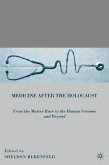The Tuskegee Study is one of the best known examples of medical malfeasance in modern history. However, there is one group that is often left out of accounts of the Study-the wives and sexual partners of the male participants. While these female partners would bear the brunt of the burden of the Study, often raising families while facing the burden of syphilis without any of the basic medical care, meals, or burial stipends afforded to their male partners, they are remarkably absent from discussions of the Study. This work is an exploration of the historical context surrounding the neglect of these women by researchers during the Study and contemporary academics alike. Most importantly, it is an examination of the ways in which race and sex affect how both society and the medical profession have treated, and often continue to treat, African American women.
Hinweis: Dieser Artikel kann nur an eine deutsche Lieferadresse ausgeliefert werden.
Hinweis: Dieser Artikel kann nur an eine deutsche Lieferadresse ausgeliefert werden.








